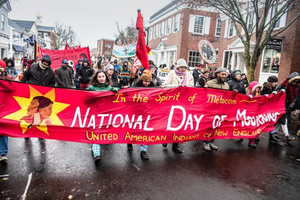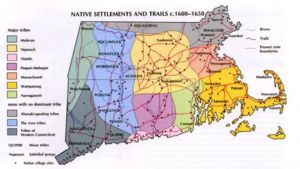More languages
More actions

Thanksgiving is a settler-colonial holiday in the United States of America that occurs on the fourth Thursday in November. In 1970, Wamsutta Frank James of the Wampanoag nation founded the National Day of Mourning to protest against this celebration of colonialism.[1]
History[edit | edit source]
1621 pilgrim feast[edit | edit source]

When the first English settlers arrived in Massachusetts in 1620, 70% of the local Wampanoag population had already died of smallpox.
The settlers held their famous three-day feast in October 1621 but did not invite any natives as they did in the mythological story. In fact, Miles Standish had built an 11-foot wall around the settlement days earlier to keep all natives out. However, Chief Massasoit arrived anyway and brought his followers to protect him from being kidnapped. This feast was not known as "Thanksgiving" until centuries later.[2]
1637 massacre and celebration[edit | edit source]
Governor John Winthrop of the Massachusetts Bay Colony proclaimed the first Thanksgiving in 1637 to celebrate a massacre of 700 Pequots in Connecticut.[3] William Bradford, who had been Plymouth’s governor for the original 1621 feast, later wrote that, "Those that escaped the fire were slain with the sword; some hewed to pieces, others run through with their rapiers, so that they were quickly dispatched and very few escaped. It was conceived they thus destroyed about 400 at this time." Modern historians believe the death toll was closer to 700.[2]
Later celebrations[edit | edit source]
The Pequots had a population of about 8,000 in 1620, which decreased to 1,500 by 1637. In 1676, Massachusetts settlers declared a thanksgiving holiday, saying that, "there now scarce remains a name or family of them [the natives] but are either slain, captivated or fled."[2]
Official recognition[edit | edit source]
In 1863, Abraham Lincoln created the modern Thanksgiving holiday based on the 1621 feast instead of the 1637 celebration, which had historically been known as Thanksgiving.[2]
References[edit | edit source]
- ↑ K. James (2022-11-19). "53rd National Day of Mourning Indigenous pride, power and protest!" Workers World. Archived from the original on 2022-11-20. Retrieved 2022-11-20.
- ↑ 2.0 2.1 2.2 2.3 Glen Ford (2023-11-22). "The End of American Thanksgivings: A Cause for Universal Rejoicing" Black Agenda Report. Retrieved 2023-11-23.
- ↑ Moonanum James (2022-11-19). "In memory of Moonanum James: ‘We are not vanishing. We are not conquered’" Workers World. Archived from the original on 2022-11-20. Retrieved 2022-11-20.
